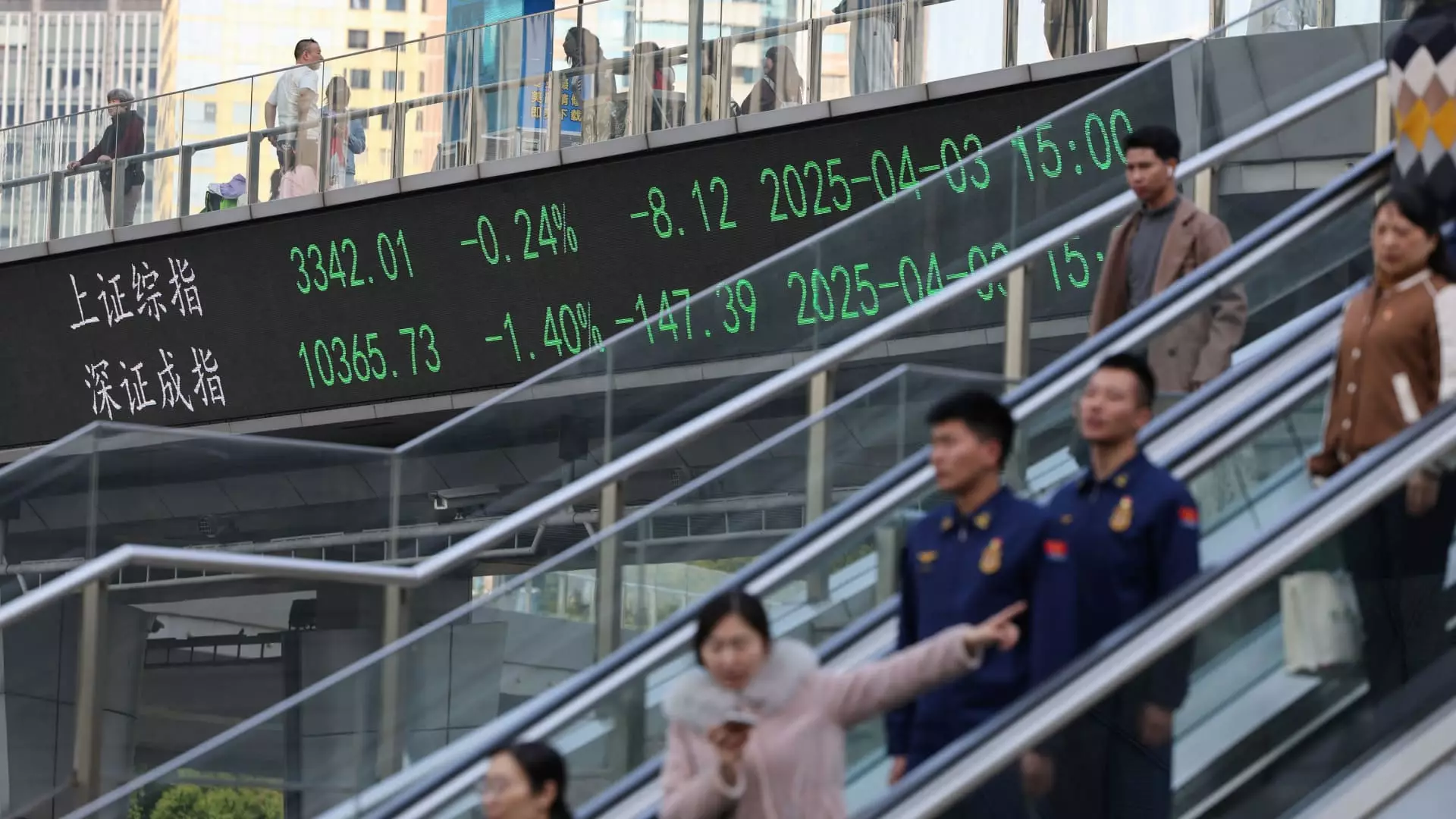In an era where tariffs and international tensions seem to cast a shadow over global markets, it is remarkable to witness the unparalleled resilience of China’s technology sector. Recent fears surrounding U.S. tariffs on Chinese goods have sent shockwaves through the stock market, prompting a flurry of reactions. However, the fundamental strength of the tech sector indicates that this is merely one of the many storms in a global investment landscape riddled with opportunities. Analysts increasingly argue that the potential for growth in domestic technology, particularly in generative artificial intelligence, may outweigh external pressures.
While stock prices initially dipped in response to U.S. tariff announcements, they quickly rebounded by market close. This reaction points to a fundamental understanding among investors that the broader implications of tariffs may not be as dire for many key players in the tech industry. Kai Wang, an Asia equity strategist at Morningstar, aptly noted that major Chinese technology companies have limited exposure to the U.S. market. This indifference validates the position that, while tariffs create a volatile environment, they may not necessarily translate into existential threats for these businesses.
A Growing Market for Generative AI
China’s ambitions in generative AI are not just a flicker of hope but a robust wave of interest backed by strong financial signals. The recent launch of DeepSeek’s AI model, boasting superior performance over popular systems like ChatGPT, showcases not only China’s innovative capacity but also its resistance to restrictions imposed by the U.S. The question thus emerges: what happens when a country refuses to stay shackled by external limitations? They innovate, they adapt, and they forge ahead.
Policy adjustments in China are expected to further accelerate growth, particularly within high-tech sectors. The government is keen to support domestic tech companies, focusing on AI capabilities that can streamline operations and optimize efficiency. High expectations in earnings growth for technology stocks breed an environment ripe for investment. If there is any silver lining in this tariff saga, it is the spotlight that has now shone on the domestic tech landscape, allowing the sector to thrive amidst centrally imposed constraints.
Competitive Valuations: A Long-Term Perspective
From a valuation standpoint, the disparity between Chinese and U.S. technology stocks presents a compelling narrative. According to analysts at Citi, the average price-to-earnings ratio for major Chinese tech stocks stands at an astonishing 52% lower than their U.S. counterparts often dubbed the “Magnificent Seven.” This significant gap raises a vital question: are investors underestimating the inherent value within the Chinese market?
Investors should consider the long-term implications of these valuations. Domestic opportunities may very well present a better entry point than exposure to U.S. markets, especially given the cyclical nature of economic recovery patterns. Emphasizing services over goods, and growth over value, is a strategy that resonates well in the unique context of current global uncertainties. The favored sectors within China, particularly internet, technology, and transportation stocks, should thus be analyzed closely as potential goldmines for discerning investors.
A Shift in Investor Sentiment
What’s particularly striking is the noticeable shift in global investor sentiment towards Chinese tech companies—nearly 25% of international investors now express positive outlooks on this space. Such optimism is underscored by data indicating a 16-month high in allocations to Chinese equities by global emerging market funds. This flip in attitude serves as a powerful reminder of the market’s capacity for recovery and rejuvenation. In times of heightened geopolitical tensions, the willingness of investors to reassess their positions indicates a mature and dynamic market approach.
This positive momentum could very well correlate with the gradual economic stabilization that China is anticipated to achieve. Analysts echo the sentiment that, despite pressures from tariffs, there will be fiscal measures in place to mitigate risks and bolster economic stability. Policymakers are not oblivious to these pressures, and their ability to adapt regulations and provide stimulus highlights a proactive approach to safeguarding the domestic economy.
Opportunities Beyond Technology
While tech stocks dominate the conversation, it’s imperative not to overlook the resilience exhibited in other sectors, especially healthcare. Excluding pharmaceuticals from recent tariffs seemingly offers an additional layer of protection for Chinese biotech companies. With many relying on collaborations with U.S. firms, these businesses have managed to position themselves as relatively insulated from the trade tensions.
The strategic advantage that companies like Wuxi Biologics possess reveals the broader narrative that innovation thrives in collaborative environments, unaffected by tariff impositions. Given the bipartisan push for lower drug prices in the U.S., the operational efficiencies displayed by Chinese biotechs serve as critical differentiators, ensuring the health sector remains a promising frontier in the ongoing economic saga.
While tariff worries have unsettled global markets, the narrative surrounding China’s technology sector and its broader economic landscape implies a scenario replete with opportunity and resilience. Active market participants would do well to recognize the compelling dynamics at play, as they may signal a paradigm shift in investment strategies centered around China’s burgeoning tech ecosystem.

